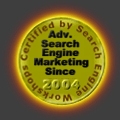 Look how old this is!
Look how old this is! I post at SearchCommander.com now, and this post was published 13 years 1 month 6 days ago. This industry changes FAST, so blindly following the advice here *may not* be a good idea! If you're at all unsure, feel free to hit me up on Twitter and ask.
Last night I did a search on Google because my wife had her car window smashed by some Portlandia hooligans while she was watching the Central Catholic High School play.
The first result for “emergency auto glass repair” was Glass Doctor, and it was a combined local listing, so I picked up the phone and called them.
It was 5:01 PM Sunday, which is when emergencies happen, so I wasn’t surprised when I got a human to answer the phone. What did surprise me though, was her telling me “I’m sorry we’re closed for the day.”.
I told her that was okay, and that I just wanted to schedule a fixed broken door glass on my wife’s car first thing Monday morning. That didn’t matter she said, and that she could do was have someone call me in the morning when they opened again. #FAIL (and I should probably nofollow their link)

The 2 and 3 results were organic, but the domain name sounded spammy, and when I looked at the indented listing page, that confirmed it. What junk! Besides, I wanted a phone call anyway…
The #4 listing was local, but also had no real “business name, and the way it was non capitalized looked bad, plus it had a spammy sounding domain name, so I called #5, Discovery Auto Glass. (note – I have norelationship with them or any domain in this space)
Discovery Auto Glass was the Winner
They answered the phone as if they were expecting an emergency, took my car model information and got my phone and address and said they would be here by 8:30 AM Monday morning. They called by 8:30 they were here by 9, and even as I write this the guy is outside now fixing it.
Why show me a closed business that can’t help me, Google? Is this a good user experience?
That’s Not Why I’m Writing This
Now I could say that by now, in 2012, in a personalized world these guys at Glass Doctor shouldn’t rank for “emergency auto glass repair” if they can’t help me at the time of day I’m searching, but that’s not why I’m writing. (Still, Google, them putting in their HOURS and me searching for “emergency” just might be a clue of when they’er a good result to show, I’m just sayin’.)
I’m writing because I although I DID find a real business that could help me, they supposedly shouldn’t have even been there, and looking at their business card just now is what inspired me to post. Their business card has no address.

When I saw there was no address, I went outside and asked the guy if Discovery Auto Glass has a nice storefront where I can go visit them? Maybe I could get some popcorn or coffee? As it turns out, no they don’t. They just do mobile dispatch. In fact, the guy asked “Why would I want that expense?” and I agree with him, and that’s the reason I’m writing this.
Google Doesn’t Want Them There
If Google has it’s way, service-based businesses, this guy with his emrgency dispatch service would disappear entirely from Google Places. In fact, my own business would also (and often does disappear from Google Places.
Why does it happen? Because according to Google, (and to David Mihm) I don’t belong there.
Google Doesn’t Want Me There
As David put it ever so delicately to me at last months SEMpdx meeting while talking to some Google reps… I’m a spammer. I’m nothing but a “ghost business” that doesnt really exist.
Sure I have clients, employees, customers, students etc., and I even pay my taxes, but because I work from a private / home office (and so do my employees and subcontractors), and because I don’t have a physical location to welcome and greet customers, Google says that I don’t belong in Google Places, and shouldn’t even HAVE a local listing. What a crock, huh?
Google doesnt actually wan’t anyone to be listed who doesn’t have a brick and mortar business, and apparently, that applies even if it’s the best option for the person searching.
Dan Austin, a Google Maps “spam fighter” says as much in this interview where he equates having no storefront to a characteristic shared by a “shady business” –
Basically, a lot of what we consider ‘shady’ industries, where the profit margins are low, the line between black and white is exceedingly grey, limited regulation, no storefront, and…
Andrew Shotland wrote the other day about his own business disappearing and quotes Google’s “policy” on the subject, putting this in his comments –
The Google Places Guidelines specify that “Only businesses that make in-person contact with customers qualify for a Google Places listing.” so I should have just said I did, which I do, just not at my home office, but when she asked if I serviced customers at this location I said “no”
I think this post is a pretty good example of why I think this “policy” is inherently stupid and unreasonable, and I hope Google reconsiders.
These are the “local search results” we’re talking about, and the fact that they chose to call it “Places” (at least for the time-being) really shouldn’t be taken so literally.
What do you think?
Should Google exclude legitimate service businesses who don’t have a public storefront from the local results? Why or why not?




















Nice arty, Scott. It’s interesting to see what real-life-process you used to find your business and the factors you used to evaluate the winner.
Picking up the phone doesn’t make the business ‘open’ so the hours they posted as being ‘open’ were false therefore their listing is inaccurate.
With a world of tele-commuters and entrepreneurs trying to compete with low-margin businesses, we’re going to see more and more businesses without a traditional brick-and-mortar location in the future, not less.
I hope Google reconsiders their position on this matter as well.
Here are a few affected businesses that I’ve come across that fall in the same category:
Wedding Planners
Contracted Plummers
Contracted Electricians
Mobile Auto Detailing
Interior Designers
so many more it would take me days to write them down…
All of the above clients/businesses have NO brick and mortar presence and yet are very much “for real.”
Like yourself I work from home , I do not have a brick and mortar. And I want customers from all over the world.
My issue with google places is at times it seems they want to pin me to my locale. Last I checked www stood for “World Wide Web” not “Local Narrow Web” limited to my physical neighborhood.
A useful example of Google’s shortcomings!
I think Google needs to distinguish between those companies whose product or service is physically delivered and those who can deliver their product or service by mail, download, etc.
If the service is physically delivered to the customer and the company is set up to do it then the clearly the company should have a local listing – just like the business pages in the local phone directory.
I’ve noticed that Google has this fixation with locality in other areas – like Checkout. I gave up on it a few years ago after trying unsuccessfully to persuade them to allow more than one currency per merchant.
Well you can add Fishing Charters to that list. I design sites for fishing charters businesses and they certainly don’t have a brick and mortor address. They have a dock, usually at a marina and you can not use the dock address because you can’t receive a Google postcard with the confirmation pin #. Even if you asked the marina staff to watch out for a postcard for you they never do it, my clients have tried.
But here is what I think is stupid about Google Places.
I have many Charter Boat Captains that fish out of Fort Lauderdale. Some of them live in Fort Lauderdale so they just use their home address. But what happens to a Captain who fishes in Fort Lauderdale but lives in the next city over Pompano? Well you just use his home addres too, Right? But here is the problem, his site never appears for Fort Lauderdale Fishing phrases on Google Places even though his site is SEO’d for everthing Fort Lauderdale. Even though the categories selected on the Places form were Fort Lauderdale. He has not one word about Pompano on his websites. But if you type in the phrase Pompano Fishing, guess what? He is number one. And nobody types in Pompano fishing. The Google Local should be for every business but apparently it’s not.
I think the most offensive comment made by Google in your article is the reference to “low margin businesses.”
This is additional evidence that Google treats deep pockets preferentially. In this economy, I find that quite pathetic.
I’ll add some more business categories to Gary’s list:
Building Contractors
Carpet cleaning services
Painters
Technical Writers
Any matter of freelance workers, the number of which has multiplied since the unemployment crisis of the past few years.
Google – part of the 1%!
Great post Scott! 100% agree. I’ve had a number of clients who fit this model, either working out of their home office or mobile services like plumbers, carpet cleaners, etc.
Google’s fixation with distance from perceived location of the searcher is totally nuts, too. Sitting here in North Portland, Google wants to find me businesses as close to downtown as possible. A fine strategy if you truly know the searcher’s location (i.e. mobile device with GPS location info shared), but IP geolocation is really a TERRIBLE way to do this for Google Places results.
Thanks Mikkel – I agree on the IP stuff too – Remember when AOL users were being shown Virginia local businesses for their results because “that’s where the IP Address is from!” ? Does that still happen? (or does anyone still use AOL? 😉
I’m absolutely with you Scott. My friend’s who paint, do remodeling work, provide interior design services, consult on search marketing like you and I do, the come to your home pet sitters, auto-detailers, home health workers and many more DO work and service people in the area – just not at a consistent brick and mortar location. We all still need a way to reach customers and those customers are looking for us!! If Google and other sites listing local businesses (Yelp, CitySearch, etc) want to serve their audiences, they need to find a way to list businesses like ours. I am using my home address and so far have been able to keep Google Places but I certainly don’t want people showing up at my front door.
Thanks for publishing this article – it is something that needs to be fixed.
Tracy 🙂